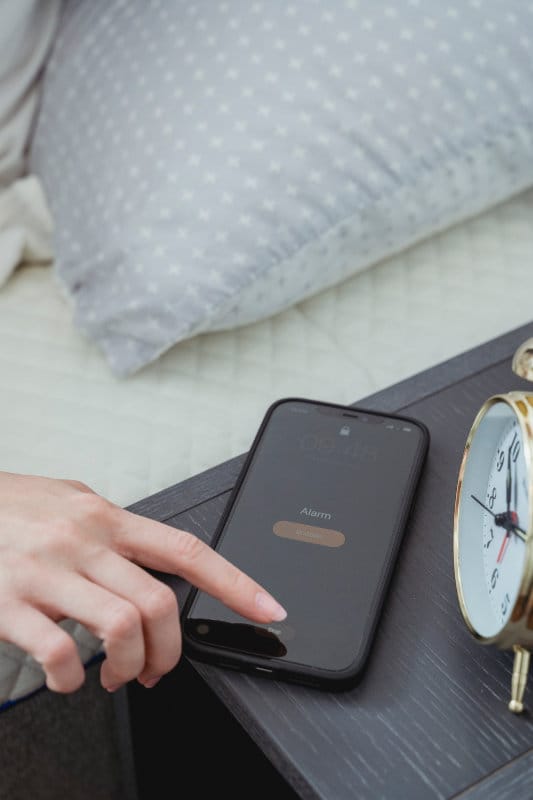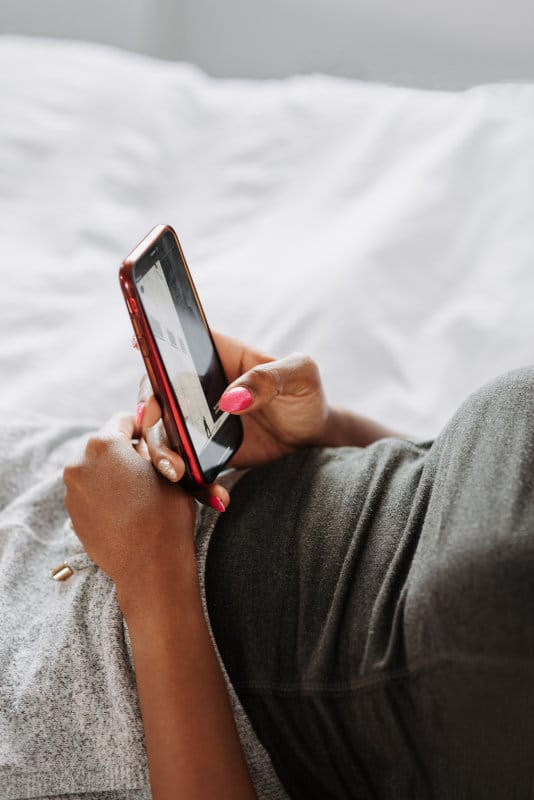These days of 24/7 availability, it’s not always easy to stay off our phones. Most people acknowledge the importance of getting sleep and recognise that using our phones before bedtime can affect both the amount and quality of rest.
In this article, I’ll share ten simple ways that you can ditch your phone before bed every night and sleep better!
1. Make a tech-free zone when you ditch your phone before bed.
The initial step in avoiding using your phone before bed is establishing an area where no technology is allowed. It could be any space in the house where one can unwind and de-stress without distractions.
It’s also essential to give yourself an incentive for going there, like taking a bath or reading a paperback book. Make sure to gather all gadgets and place them in one designated area.
2. Limit the “last look” to once.
Numerous people have formed a routine of using their devices before bedtime, during the middle of the night and immediately upon waking up.
This sends you into a spiral of stress and triggers your brain to be awake in bed. If you’re going through this cycle every night, try to limit looking at your phone before bed by setting the alarm so that it’s easier to stick with one last look before turning off all lights and heading off to sleep.
3. Mute the notifications.
One effective strategy to reclaim your sleep sanctuary is to liberate your bed from your smartphone’s constant buzzing and chiming. Muting notification is a simple step. A serene environment is conducive to relaxation by silencing the barrage of alerts.
For those who crave a more decisive break, activating aeroplane mode can be a game-changer.
Alternatively, if parting with your phone seems too drastic, consider designating a separate, less disruptive device for alerts. An old flip phone or tablet can serve this purpose admirably, allowing notifications to pass without infringing on sleep.
4. Use an alarm clock.
Opt for an old-school solution by incorporating an alarm clock into your sleeping routine. Overcoming the tendency to depend on the snooze button on your phone can be quite a task if you have become accustomed to relying on it as a backup.
Establish a nightly routine by setting an alarm 15 minutes before bedtime to serve as a gentle reminder that it’s time to unwind and prepare for a restful night’s sleep.
By adjusting the alarm to go off thirty minutes before the intended wake-up time, train your body to wake up around that timeframe, avoiding the reliance on hitting the snooze button.
This positive shift encourages your body to establish a consistent sleep routine, typically aligning with bedtime. Determining the appropriate time is crucial, considering the hour and time zone.

5. Silently charge your phone in another room (or in aeroplane mode).
The light from your screen can be an energy drain for our brains, so if you’re going to charge your phone, do it in another room.
Use aeroplane mode to charge your phone. If you must charge it in the same room as you sleep, use aeroplane mode so the device doesn’t emit any signals or electromagnetic waves while plugged in and charging.
Put the device far away from your bed—preferably across the room! No matter how often I hear this tip (and I’ve heard it a lot), I still forget to implement it before drifting off at night—but when I do remember, my brain seems clearer, and my sleep more restful than usual afterwards.
6. Go old school – read a book or magazine!
While it may be tempting to utilise your phone as a booklight or resort to screen-based applications, the true pleasure of absorbing the words and allowing them to permeate your mind lies in opting for a physical book. This choice not only aids in winding down before bedtime but also shields you from the detrimental effects of blue light emitted by screens, ensuring a more restful and fulfilling reading experience.

7. Don’t sleep with your mobile phone.
Avoid the common sleep disruptor – refrain from sleeping with the mobile phone under the pillow or near the bed.
The adverse impact on your sleep extends beyond just physical proximity. Having your phone within reach can actually harm the quality of your sleep. For light sleepers who often succumb to the temptation of checking the time or scrolling through notifications during the night, creating a physical distance between you and your phone is essential.
Consider relocating your device to a designated spot outside arm’s reach, preventing impulsive interactions that can disturb your restful slumber.
8. Journal
Journal about your day instead of social media stalking.
Ditch your phone before bed, and when waking up at night and needing something to do, try writing in a journal about anything on your mind.
Writing in a journal transfers your thoughts from your mind onto paper or a notebook. Keep it brief, and don’t dwell much on your writing. It can help relax and get back to sleep. If you don’t have a journal, write on paper or doodle until your eyes are heavy again.
Spelling or grammar shouldn’t be a concern, especially when half asleep. They are the least of your worries at that time.
Just write whatever comes to mind. Remember what you did that day if you’re having trouble saying something.
- Did you have any unexpected run-ins with friends or family? What did they say?
- Did you eat anything unusual?
- Who were you with?
- What was the weather like?
- How did it feel to be outside?
- Was there anything that made you angry or happy that day?
9. Take a bath or meditate.
Being mindful of your body’s needs is a great way to disconnect from a device. It also helps you wind down for sleep by engaging other senses and relaxing as much as possible before sleep.
10. Try some deep breathing exercises.
Deep breathing helps relieve stress and relax the body while sharpening focus and attention.
Consider incorporating deep breathing exercises into your bedtime routine as a calming practice to help relax your mind and body before drifting off to sleep. Try it first thing in the morning, too—it’ll help clear your mind and energise you for the day ahead.
Conclusion
Ditch your phone before bed is worth it for better sleep and a healthier, calmer you.
If you are trapped in a pattern of exhaustion, these straightforward suggestions and techniques can help. Give them a try tonight—you’ll be surprised by how much they can improve your quality of life!
Watch the Video Summary
Images Used
Photo by Anete Lusina from Pexels: https://www.pexels.com/photo/woman-using-phone-in-bed-9832081/
Photo by Miriam Alonso: https://www.pexels.com/photo/crop-woman-snoozing-alarm-on-smartphone-7622520/
Photo by Samson Katt from Pexels: https://www.pexels.com/photo/crop-ethnic-woman-with-smartphone-embracing-dog-on-bed-5256079/





0 Comments